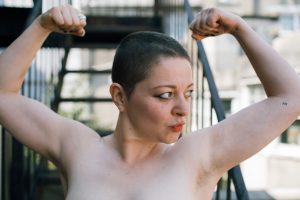
My Creative Producers International Journey
It is necessary for me to describe my CPI experience as both professional and personal development, from which has grown an enhanced and transformative relationship to what I think, feel and know, and an appreciation of my experience as a tool of change and progression. Two years ago I received a development grant from CPI. It was originally intended to be used to develop a Mental Health Pride event for Brighton, however shortly after it was awarded I was signed off work by my doctor and advised by my colleagues and mentor to explore less potentially-triggering work and focus on my personal development in relation to my health, limitations and ambitions. This became a future-imagining and strategy development for myself and my work. It was initially very disappointing not to be able to deliver the big ‘ta da’ I had hoped for, and I definitely struggled with the idea that I would be delivering less than my peers, but on reflection I am incredibly grateful to have been able to immerse myself so fully in my relationship to disability and to ambition.
Method and Madness, My Body of/for Work
A key realisation has been that my pace will always be set by my body/health and by how much energy I have on a given day, and the more I can respect and accept that the better my work will be. Thanks to the CPI I was able to commit my whole attention to personal methodology, and to develop a new relationship to my work and to my own standards and frustrations.
The first task was to realistically assess where I am professionally and how to realise my ambitions. I sought advice from Unlimited, the organisation who nominated me for the CPI programme, and they put me in touch with Sarah Pickthall, an independent Producer and artist, and co-founder and leader of the Sync Leadership programme. Sarah’s practice is about energising, informing and ultimately changing disabled and Deaf people’s relationship with leadership, by offering information and support, encouraging dialogue and designing leadership interventions. It’s also about bringing into the spotlight the skills, experiences, techniques and approaches that come from these that are resonant to all. My mentoring sessions with Sarah Pickthall have been invaluable in helping me to appreciate that, whilst I am still very young in this career, only three or fours years in, I already have a style and reputation that attracts opportunity, that my projects are valuable to others, and that I have the connections, knowledge and skill to pursue my dreams, even if I do not recognise myself in much of what is considered ‘standard practice’. There is still a LOT for me to learn and I am excited to see what further investments I can make in myself and my education as a life-long practice.
So what do you do when you can’t work, but can’t stop thinking about work? One experiment was to pay myself for research and development of horizontal/bed bound working practices: using ‘sick days’ to listen to podcasts, to make voice notes, and to learn to zoom out of the panic of being ‘unproductive’ and see every aspect of my practice (and the fact that I do basically think about work or at least my ambitions all the time anyway) as valid and valuable. Most of my professional experience has been as a solo artist, a state of almost 100% delivery, no stability and a lot of pressure to undercut and outshine competitors, and so to take a step away from ‘delivery’ into ‘strategy’ makes me feel much more like I am in command of my professional life.
I often have days when it’s not possible to work at all, or when simply getting dressed into a professional ‘disguise’ to go for coffee is enough to wipe me out and send me to sleep for the rest of the day. I only have so much energy and to spend it punishing myself and comparing myself to others instead of being rested and ready to put my next round of energy to best use is absolutely contrary to what I understand the point of CPI and this development funding to be.
That said, being supported to say ‘no’ to work for a period has been very challenging: I place a lot of personal self-worth on being productive and busy – too much! Really taking the time to learn to accept that I cannot be my ideal vision every day has been personally very moving, messy and relieving. I have emerged feeling confident that ‘being able to work less’ actually manifests as ‘being selective about and highly dedicated to what I say yes to’
Re-defining ‘Producer’ for myself has been a major part of CPI. Hearing the vulnerabilities and questions of the cohort, of my new respected friends, I have realised that I am just as (un)prepared as anyone else; behind the curtain of ‘institution’ are individuals and groups trying their best to make change, and that my own largely ‘outsider’ perspective is not missing because it is not wanted, it is missing because mental health stigma and capitalist aversion to vulnerability has kept it outside. I have also been able to move from emergency accommodation into a small studio in Brighton from where I can build my practice with a degree of stability that I did not have before. This has had a massive impact on my ability to work and rest at all!
Deliverance from Delivery
This period of reflection has been complimented by my primary project, The Sistxrhood, benefitting from a ‘fallow year’ at Glastonbury festival in 2018. For the first time since our genesis in 2016, I have been able to consider our successes and future plans and what I really want to get from the work for myself, as well as for feminism, for the festival sector and for my collaborators. Largely, I have realised that my current music festival context, and lack of resources, are limitations for my broader social aims, and that I need to expand and exist in the wider world to really practice what I preach and maximise participation.
Through CPI overall I have begun to see opportunity, and this is not to be understated, where I never could have imagined myself belonging, often because I simply didn’t know it was there before. Our first lab together in particular really blew my mind; hearing about what everyone else does for work, how they operate and what kind of work is funded and needed. It sounds silly but my most frequent thought was ‘that’s your JOB?’, particularly when people would describe working for an organisation, not in a way that questioned it’s validity but a reaction to the fact that I am simply not used to being engaged or employed because of how I think, what I believe in. As a performer, there was little room for mistake, or recalibration, or process, only for delivery of perfection every single gig. To be in a room with people who live in process, in conversation, in development was revolutionary to me and has given me a huge boost of confidence in my own ability to join in and pursue my dreams.
During this period I applied for and secured developmental funding to put on my own independent festival, POWERHOUSE, on September 26th 2020 at Cambridge Junction, via their Vision Mixers scheme. As an aspiring creative producer-curator-festival director hybrid this is The Dream! This will be the biggest project I have ever worked on, with the final ‘ta da!’ not due until September 2020, a timeframe and challenge I am incredibly excited about. Maybe a really good ‘ta da’ just takes a little longer…
What’s Next?
Now that CPI is coming to an end, it is time for a scaling up ambition – for me personally and for the collective. Working outside of the restrictions of Glastonbury (no sponsorship allowed) I am able to accept the corporate and branded sponsorship I have previously had to reject, and will be able to work from a completely fresh set-up, rather than having to navigate the elaborate and often mysterious working ways of Glastonbury festival. I will be able to pay myself and the crew, and this will be done so that everyone involved is paid exactly the same day rate, recognising all contributions as equally valuable and appreciated. We owe Shangri La and Glastonbury a lot, but now is the time for me to expand and seek opportunity elsewhere; already-stretched festival budgets cannot begin to cover the amount of work that goes into producing an experimental venue with social and political aspirations, and we are all frying bigger fish across music, theatre, community and fine art projects, projects that can be potentially be better showcased and appreciated outside of hedonistic witching hours.
I am really excited by the new opportunity for community development in Cambridge: I want to make sure the festival provides opportunities for those who are local/rural to the city, young people whose immediate options are to become a servant of some kind to the universities that dominate the city. We have always had at least one apprentice technician onsite at Glastonbury, and now I am writing a 9 module programme in training up 15 new Culture Ninjas, who will learn everything from how to set up a club night, soundcheck a band, DJ, run a radio show and organise a protest, to defining their own values and ambitions and working with diversity and inclusion at the front of everything.
Leadership is a skill I am naturally drawn to but a title I am reluctant to claim. Working with Sarah Pickthall has been an absolute revelation in regards to this: she has a way of holding my highest ambition and deepest insecurity together in a way that shows me the different aspects of myself as a system, as an holistic experience of life, art and disability all at once, and she manages to make it make sense that an unpredictable energy condition can be fuel for the stability and leadership I want to offer to others. I will continue to work with Sarah in future.
“Deciding which disabled producer to suggest for inclusion in the CPI programme was tough – it was such a potentially life changing opportunity. We are so pleased and proud that we offered the opportunity to Alice who has not only gained immeasurably from it but equally given immeasurably to it as well. Her contributions have done more than we could ever have hoped to ensure the whole cohort of producers and partner organisations are more open, more aware and more equipped to work with a wide range of humans – including those with impairments and access requirements – in and at every step of their journeys. But Alice’s contribution’s covered so much more – class, gender, norms, ways of thinking, ways of being and more… I’m so pleased she has gained a new sense of how to contribute to this sector taking her own needs into account as a starting point – and she has made sure others are fully aware of the power and the potential of working in this way. Roll on Powerhouse. I’ll be there!” – Jo Verrent, Senior Producer, Unlimited
